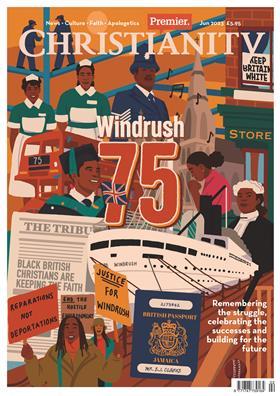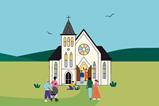
It’s a sobering thought, but the next time the Census religion data is revealed in ten years’ time, the Church in England and Wales is unlikely to have grown. Look ahead to 30 years’ time, and the number of Christians will make for even more grim reading. Unless revival happens, of course. God is, after all, the God of the impossible.
If we’re going to get through the next few decades, it’s going to take all of us, in one place, as were the early Christians on the day of Pentecost (Acts 2:1). For me, that means fewer monochrome congregations, more multicultural churches and a more diverse church leadership. Yes, this is about racial justice, equality, diversity and inclusion, but it’s also about survival. The Church cannot grow if we continue to present a picture of the kingdom of God that is divided.
Rev Dr Martin Luther King Jr once said that 11am on a Sunday was “the most segregated hour of the week” in America. The picture of the UK Church over the past few decades has looked similar, and it has never made sense to me. The early Church was a messy collective of Christ followers from all different backgrounds, working out their lives and faith together in spite of their differences. So why do we have Black-majority churches, Chinese churches, South Asian churches and Latino churches today?
Some years ago, I spoke to the leader of a Chinese denomination in London, who told me that while it wasn’t ideal, there are practical requirements to consider. How can you worship in English if you can’t speak English, for example? I understand these challenges, but remain dissatisfied with the lack of action towards integration. There are some exceptions: the One People Commission is one organisation attempting to bring together leaders from across cultural denominations to promote unity, while celebrating diversity.
The fact remains that monoethnic churches still often exist because of racism and exclusion rather than preference. When the Windrush Generation arrived in the UK, they were often turned away from white churches; one reason why some started their own congregations with people from similar backgrounds. The same lack of welcome has been experienced by subsequent migrants arriving on these shores, and so the pattern repeats itself.
Having said this, despite being brought up in the UK, some of my most powerful encounters with God have been alongside thousands of other Black people worshipping together. There is a profound sense of beauty in gathering excluded and oppressed groups, who turn their hearts together towards a God of justice who welcomes them.

The future of society is predicted to be much more interracial as barriers are broken down between people. How odd would it look if the Church continued to divide along racial lines? On a practical level, this is not just about Black people joining white churches and having to conform to their culture. We need to ask ourselves what we can learn from each other. What can we learn from immigrant churches about generosity, hospitality and justice, for example? We as the Church need all the ideas and innovation we can get if we are to survive as a community of people who point to a God who welcomes all.
This article was published in our Windrush 75 special issue of Premier Christianity. Subscribe for half price





































No comments yet